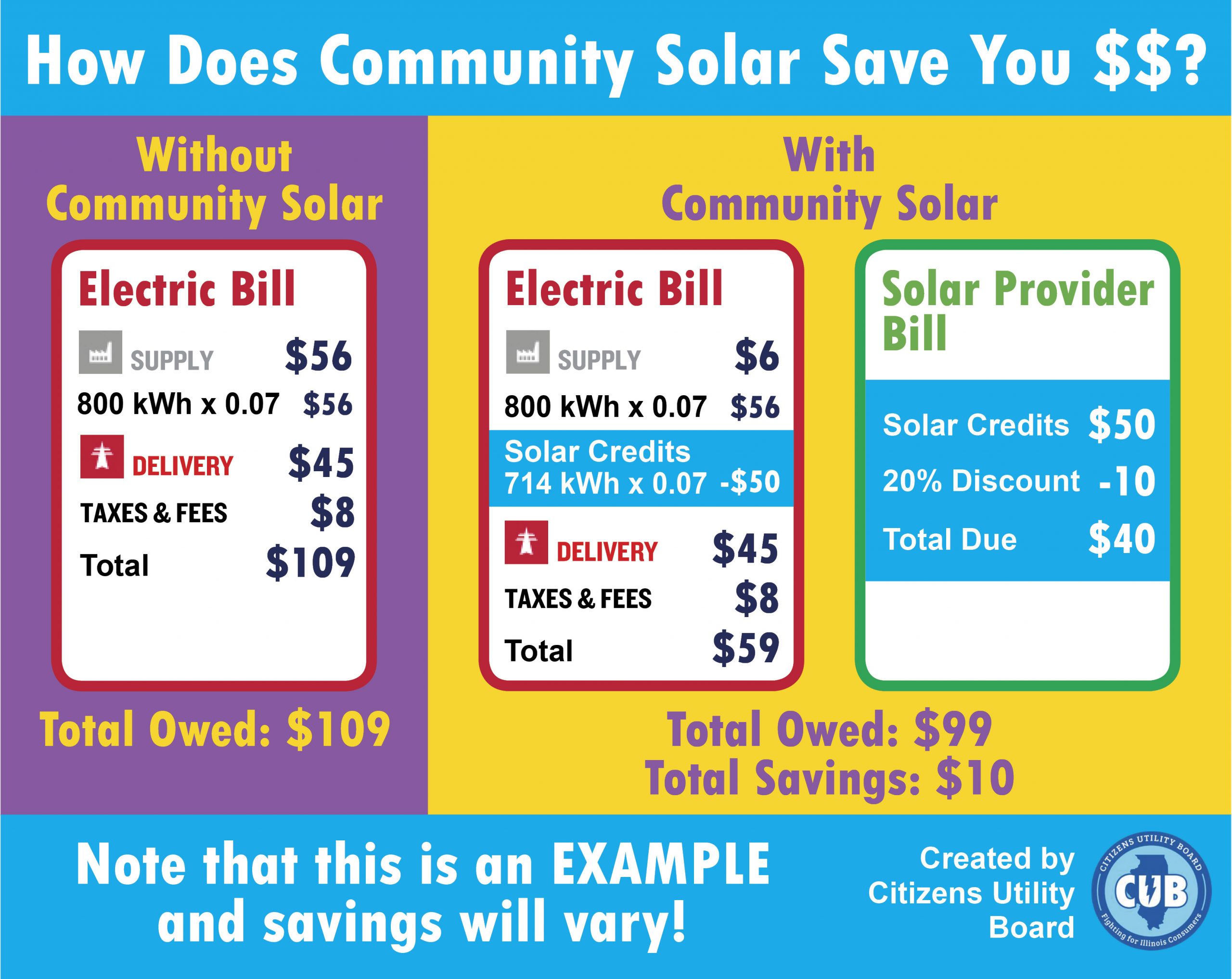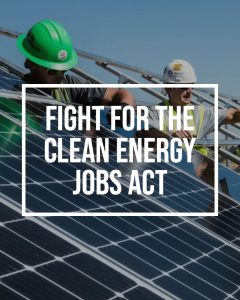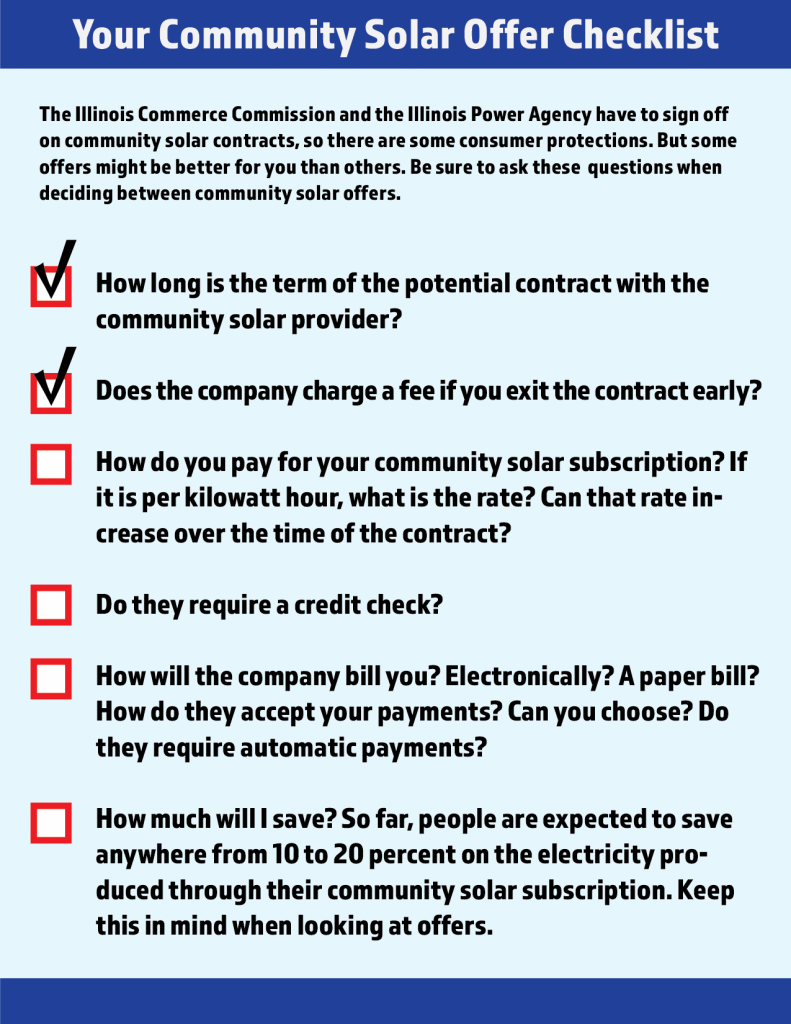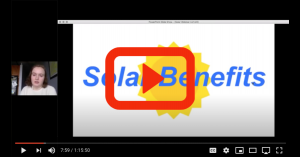Welcome to Solar in the Community
Illinois’ new community solar program allows electricity customers to enjoy the benefits of solar energy without installing panels on their own homes. Solar in the Community is a free resource—brought to you by the nonprofit consumer group Citizens Utility Board (CUB)—to educate consumers about the program and help them assess community solar offers on the market. Note: This resource is about Illinois’ Community Solar program. For information about rooftop solar, go here.
How Does Community Solar Work?
Community solar is a great new program, especially for people who can’t put solar on their own homes. It allows consumers to save money on their electric bills for energy produced by large, offsite community solar projects, similar to how you would save on your electric bill if you installed panels on your own property.
The owner of the community solar garden pays the upfront costs to build, maintain and connect the garden to the utility’s power grid. When you sign up for community solar, you are subscribing to a portion of the project’s monthly output. Your community solar provider will analyze your household’s energy demand to determine your subscription size. Each month, you’ll pay your community solar provider for the amount of electricity generated by your subscription. The provider then reports the output of your subscription to the utility, and the utility company adds credits to your electric bill equal to that output.
To participate in this program, you must be an electric customer in the utility territory where the community solar project is built. Unfortunately, most municipal utility or co-op customers cannot sign up for community solar, because there are no community solar projects being built in their electric provider’s territory.
Click HERE to download a PDF of CUB’s Community Solar fact sheet.
Watch CUB’s video: What is Community Solar?
And here’s an example of how your bill could look with community solar.


Why is Community Solar Possible Now?
The Future Energy Jobs Act, historic state legislation passed in December 2016, calls for 400 megawatts (MW) of community solar projects to be developed by 2030. That’s enough to power up to 150,000 households.
If the General Assembly passes the Clean Energy Jobs Act, we could see an expansion of community solar funding and opportunities.
Sign this petition and tell your legislators to pass CEJA!
Community solar allows more Illinois consumers to support renewable energy, and CUB is pleased to see offers hit the market. These offers help consumers lock in long term savings and help Illinois transition to renewable energy. We have reviewed all the offers currently available and written up our findings on each. The offers in this tab are part of the Illinois Shines program and are not specifically for low-income consumers. Before signing up for any of these offers, check to see if you qualify for Solar for All, Illinois’ low-income solar program (read more about Solar for All in the next tab).
Watch CUB’s Video: How Do I Choose a Community Solar Offer?
Below are the current Community Solar offers vetted by CUB (click to read CUB’s assessment of the offer). These may not be all the offers on the market:
For easier comparison we also created a printer-friendly chart. Click here to download the chart. CUB recommends comparing multiple offers and understanding all the terms before signing up for community solar. Always read your contract thoroughly.
Solar For All
Solar For All is Illinois’ low-income solar program, and it also aims to make solar accessible to people living in environmental justice communities. Like Community Solar, it too was created by the Future Energy Jobs Act. Solar for All has sub-programs for: Rooftop Solar, Non-Profit and Public Facilities, and Community Solar.
To participate in Solar For All as an individual, you must be at or below 80% of Area Median Income. This amount varies based on the number of people in your household and where you live in the state. Check this chart to see if you qualify. You do not need to live in an environmental justice community to
be eligible for Solar For All–you just need to qualify based on income.
If you do qualify, Solar For All is the best, most cost-effective way for you to go solar or subscribe to a community solar project.
The Illinois Solar for All program maintains a list of all community solar projects. The list includes information on whether each project is currently accepting new subscribers, how to sign up, and the target audience of each project. If you have any questions, don’t hesitate to contact CUB.
Frequently Asked Questions
- What are the benefits of community solar?
Signing up for community solar can lower your overall electric costs, while also supporting renewable energy development in Illinois. Community solar can also improve the power grid’s reliability, and adding solar power to the grid lessens the need for expensive power plants, lowering market prices for all.
- Who can be a subscriber?
All residential and business customers can subscribe to a community solar garden—as long as it’s located in their electric utility’s service territory. The minimum subscription per customer is 200 watts, or about one solar panel.
- Do subscribers directly receive power from the solar garden?
No. Unlike a home with its own solar panels, there’s no way to send the power generated by a solar garden exclusively to a subscriber’s home. Like all electricity, power produced by a solar garden is sent to the utility’s grid and distributed indiscriminately the moment it’s created.
- What if I move?
If you move to a new home within your utility’s territory, you can take your subscription to your new home. If you move outside the territory, you must cancel your subscription or transfer it to another customer who meets the eligibility requirements.
- Will I pay a fee if I end my subscription early?
You may have to pay a termination fee. That’s a good question to ask when you are considering a community solar project. Also ask if you are required to participate for a certain number of years.
- What is the community solar disclosure form?
Both Illinois Shines and Solar for All require community solar companies to provide consumers with a disclosure form. This form includes contact information for your provider, how to file a complaint with the program administrator, the length of the contract term, when you’ll start receiving bill credits, any fees you’ll be responsible for, and whether your provider is guaranteeing savings.
Because each company is required to fill out the same form, it makes it easier for you to compare offers apples-to-apples, and make the best decision. The disclosure form includes a lot of the terms laid out in your contract, but still be sure to read your contract thoroughly.
| Want More Information? Dive Deeper
Community solar is a part of the Adjustable Block Program, which includes individual solar installation incentives. Learn more about the Adjustable Block Program here or on their website for consumers, Illinois Shines. (Illinois Shines is the brand name for the Adjustable Block Program.) When the Illinois Power Agency (IPA) opened up the application for community solar projects, it received significantly more applications than the agency could fund. In April 2019, the IPA held its first lottery to determine which proposed community solar projects would get funding. Click here to see the lottery results. The lottery was split into two groups, one for Ameren and MidAmerican Territory (Group A) and one for ComEd Territory (Group B). The IPA split it because these projects are funded by utility ratepayers, and the agency needed to ensure that the correct number of projects were built in each territory. For a list of projects in progress, click here. |
Get Connected
See CUB’s Clean Energy page for a full listing of our fact sheets. Listen to this episode of Power Source, CUB’s podcast. CUB’s resident solar expert, Christina Uzzo, lays out the different ways to go solar, the incentives for switching, and where to find good information about the renewable resource. Watch CUB’s Webinar on going solar in Illinois. Find out if your home is right for solar panels and take a deeper dive into community solar.
|



